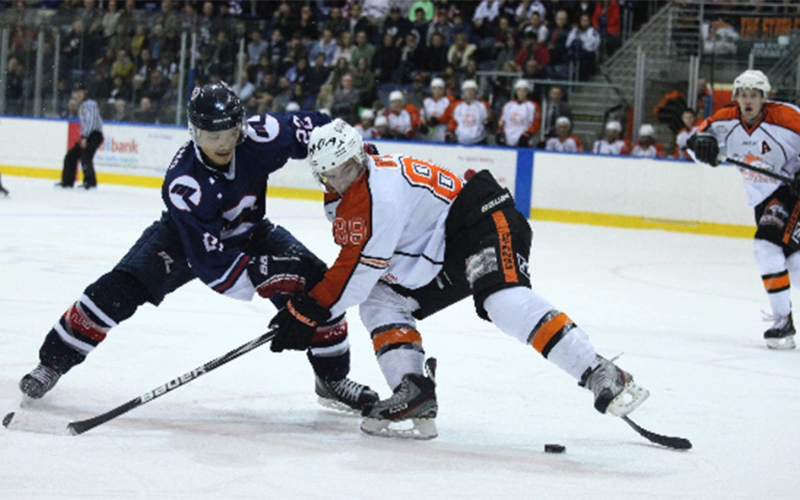A financial mismanagement scandal has hit the sport of Ice Hockey in Australia, and its President has stepped down in disgrace. Sandi Logan with the story.
Ice Hockey is not a major sport in Australia, or anywhere else in the southern hemisphere. In Northern and Eastern Europe, Russia and North America, however, it has a huge following as a professional (and Olympic) sport. But now the game of heavy padding, squared off sticks, and flat pucks is making headlines for all the wrong reasons.
In what has come as no surprise to many in Australia’s small and disparate (some say desperate) ice hockey community, president, Dr Ryan O’Handley, has stepped down in disgrace, admitting to understating financial losses at Ice Hockey Australia (IHA).
Indications are his board’s underreporting runs into at least six figures – maybe much more.
“Recognising the inconsistencies from the past reporting period, Dr O’Handley will step down as President and Chair of the Board,” newly appointed president Tim Kitching said in a 9 September statement posted to IHA’s website. “Last financial year’s reported losses are expected to be larger than initially stated.”
Kitching said there were no indications yet of potential fraud or misappropriation, but he has ordered “a thorough investigation and review” into the organisation’s finances with a two-week deadline.
He said until such time as the evidence suggests anything more than the re-issuing of an accurate financial statement, he wouldn’t speculate on any matters being referred to the Australian Securities and Investment Commission and/or the Victorian Police Fraud Squad.
Skating on thin ice
In February 2022, the former treasurer of the 5000-member strong IHA, Adrian Miller was was dumped from the board in a coup.
Miller had stood up to then-Melbourne fraudster Grove Bennett, who O’Handley backed into the role as president at the same time. Canadian creditors were chasing the Australian fugitive for over $1M in unpaid debts as he made his run for the presidency of the IHA board.
Corporate chicanery unveiled, Ice Hockey Australia supremo gets iced
“When I was deposed, IHA’s members were left with $1.9m in cash reserves, and that’s now down to $328,000 if the accounts submitted are to be believed – which IHA has admitted they cannot be,” says Miller.
Ice hockey has been played in Australia since 1906, and is one of the International Ice Hockey Federation’s oldest members. It has attracted a cohort of questionable characters to staff its board.
IHA operates under the Corporations Act 2001 as a company limited by guarantee.
Members’ annual dues are essentially its sole income. The only time in recent years the IHA has secured taxpayer (Commonwealth) funding was when the Department of Social Services allocated $342,000 in 2022 for the sport’s fledgling para (or sled) hockey program. Both the men’s and women’s para teams travel overseas, competing in events where they are regularly humiliated by far stronger and more experienced opposition. Scores of 40-0 are not uncommon.
No financial records have ever been published on IHA’s website or released to its membership about this program. “If I were still on the IHA board,” says Miller, “I’d be shoring up my own case against an accusation of impropriety.”
Poor reporting and governance
A respected Victorian businessman (who asked to remain nameless) with a strong community sports background said: “I’m amazed at the continual incompetence being overlooked or accepted by the membership-paying people. Unjustifiable spending seems to go unnoticed or not challenged.”
Kitching, a former NSW police officer and detective, who transitioned into roles in risk management, governance and more recently as an Executive Coach, was appointed to the IHA board in July; weeks later, he has been catapulted into the president’s chair.
“Dr O’Handley stepped down at a Board meeting on September 5,” Kitching told me. “I am not privy to any conversation/s prior to July with the ex-president or treasurer, and would be cautious to speculate as such.”
Those familiar with that 5 September meeting describe it as tense and at times confrontational. O’Handley was queried about a lack of supporting evidence for IHA expenditure. He allegedly said it was not necessary to share that with the eight member associations, let alone the broader membership. Several board members stood up to O’Handley, demanding transparency and accountability, at which point O’Handley threw in the towel.
Kitching told MWM,
In short, this is an issue of poor governance, poor communication and poor financial control.
“I need time to speak with all my fellow directors to establish the best way forward. We cannot simply operate on a break-even basis year in and year out.”
“Ice Hockey Australia is committed to sharing the updated financial position for FY25 with our key stakeholders, and if the regulation requires, an amended statement to ASIC or any other body. The loss relates to growing costs and over-investment with national teams and leagues, a reduction in key income streams, and complications with the timing of funding.”
“Ice Hockey Australia does not believe there’s been any impropriety, and are committed to a full, transparent, and thorough review as we seek to establish the best governance standards in sport. We will be transparent with our member associations regarding the outcome.”
Another former president of Ice Hockey Australia and veteran company director, Sydney-based Miranda Ransome, says, “I don’t think member associations are all that engaged, so they probably have no idea about the business of IHA and what the pertinent issues may be.
“In most instances, they are struggling to do their jobs at a state level. Clearly, it was a disengaged board that didn’t understand its fiduciary duties,” she said.
Herein lies the great challenge for IHA: its constitution assigns control to its eight member associations, a small pool of electors easy to control and corral into a voting bloc. There has long been a call to adopt an election model in which 5,000 members vote directly for board members to manage and operate IHA.
Cover-up over: Scott Morrison’s ‘Sports Rorts’ advice finally released
Sandi Logan was a journalist from 1974-1984 (Fairfax, Toronto Sun, ABC-TV & Radio); a DFAT diplomat from 1984-2002, serving in Port Moresby (1988-90), Bonn (1993-96) and Washington DC (1998-2002); a media adviser to federal Liberal and Labor ministers; a communications executive and spokesman for the AFP and the Department of Immigration; and most recently an author of the non-fiction book BETRAYED (Hachette). Originally from Canada, he has also played ice hockey for more than 60 years.

